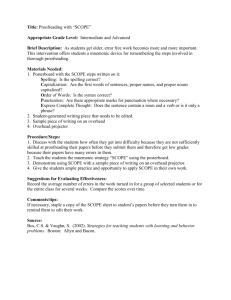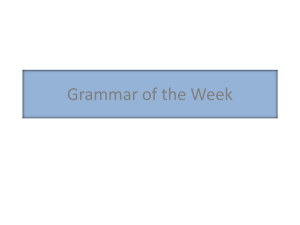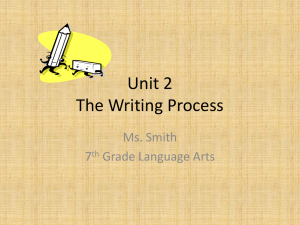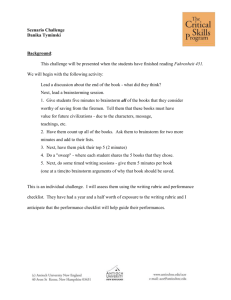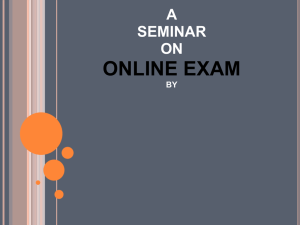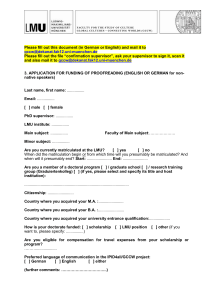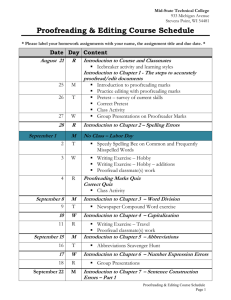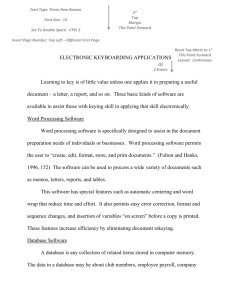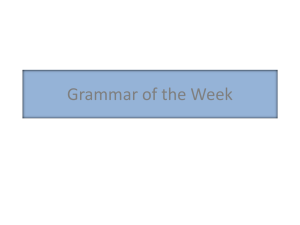Further guidance on checking of assignments
advertisement
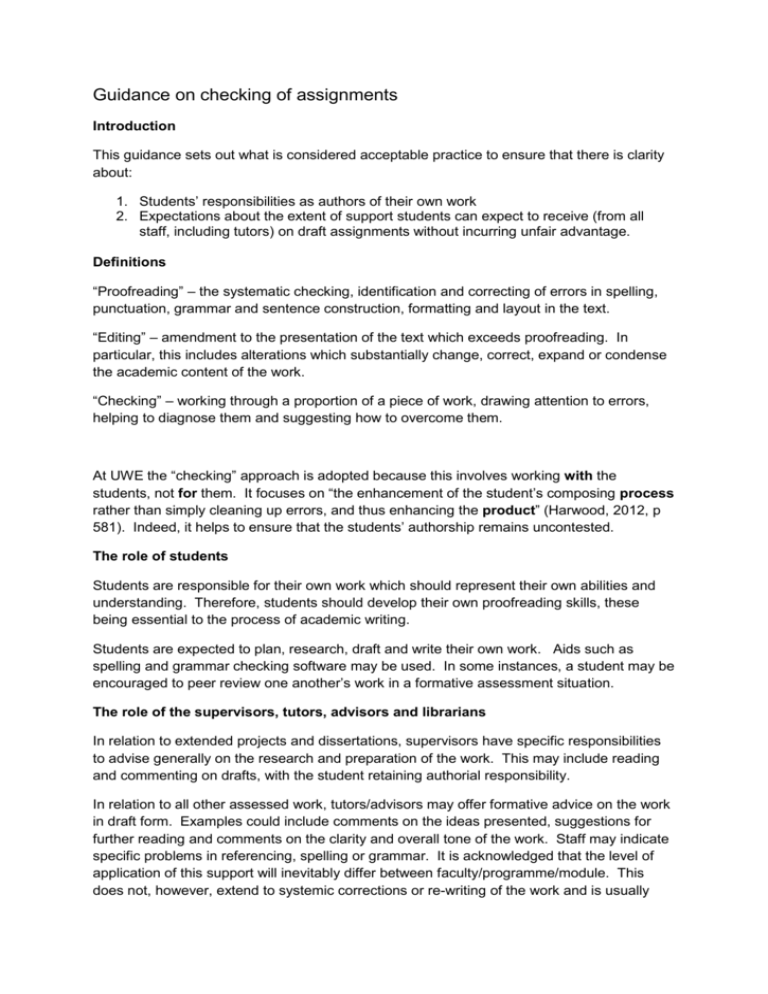
Guidance on checking of assignments Introduction This guidance sets out what is considered acceptable practice to ensure that there is clarity about: 1. Students’ responsibilities as authors of their own work 2. Expectations about the extent of support students can expect to receive (from all staff, including tutors) on draft assignments without incurring unfair advantage. Definitions “Proofreading” – the systematic checking, identification and correcting of errors in spelling, punctuation, grammar and sentence construction, formatting and layout in the text. “Editing” – amendment to the presentation of the text which exceeds proofreading. In particular, this includes alterations which substantially change, correct, expand or condense the academic content of the work. “Checking” – working through a proportion of a piece of work, drawing attention to errors, helping to diagnose them and suggesting how to overcome them. At UWE the “checking” approach is adopted because this involves working with the students, not for them. It focuses on “the enhancement of the student’s composing process rather than simply cleaning up errors, and thus enhancing the product” (Harwood, 2012, p 581). Indeed, it helps to ensure that the students’ authorship remains uncontested. The role of students Students are responsible for their own work which should represent their own abilities and understanding. Therefore, students should develop their own proofreading skills, these being essential to the process of academic writing. Students are expected to plan, research, draft and write their own work. Aids such as spelling and grammar checking software may be used. In some instances, a student may be encouraged to peer review one another’s work in a formative assessment situation. The role of the supervisors, tutors, advisors and librarians In relation to extended projects and dissertations, supervisors have specific responsibilities to advise generally on the research and preparation of the work. This may include reading and commenting on drafts, with the student retaining authorial responsibility. In relation to all other assessed work, tutors/advisors may offer formative advice on the work in draft form. Examples could include comments on the ideas presented, suggestions for further reading and comments on the clarity and overall tone of the work. Staff may indicate specific problems in referencing, spelling or grammar. It is acknowledged that the level of application of this support will inevitably differ between faculty/programme/module. This does not, however, extend to systemic corrections or re-writing of the work and is usually achieved by checking a small proportion of the work with a view to developing students’ confidence and independence. The students take responsibility for considering the comments and incorporating the changes as they see fit and then using this learning in future assignments. Proofreading and breaches of academic integrity It is important that students maintain academic integrity and therefore proofreading, by anyone other than the author, is only condoned in the following instances: Group work- where students take collective responsibility for a piece of work, it will be entirely appropriate to proofread others’ contributions Encouragement of collaborative practice – in some contexts, discussion of others’ drafts is encouraged as part of the learning outcome of a module Taking advice from others is permitted, but maintaining authorship is imperative. Students should be alert to the risks associated with essay-checking websites. The uploading of work may lead to its distribution publicly which, in turn, could expose students to academic misconduct allegations. Further information on the University’s assessment offences policy is available on the university web site. Support for students All students have access to the Academic Success support provided by the faculties and services listed on the study support and study skills web pages, via the library’s Ask a Librarian service and by emailing academic.skills@uwe.ac.uk. Module leaders and tutors can offer general guidance on the direction of the work and specific comments on areas for improvement or errors. It the work is an extended project or dissertation, the tutor/supervisor will have specific responsibilities to provide guidance on the direction of the research. This will be clear in the module/dissertation handbook. Support for students with specific learning difficulties The Disability Service will work with students to identify appropriate support as recommended in the student assessment of need (confidence rating, diagnostic, etc.). This may include the use of appropriate assistive technology and one to one support with a Specialist Learning Development study skills tutor, where effective proofreading and editing strategies can be developed as part of their academic development. Support for students with English as a Second Language The Library offers Language courses and workshops to help with academic writing skills more generally. Quick help Here is a suggestion for a number of key things students should address before seeking further help: 1. CAREFULLY READ over their work before meeting with a staff member and preferably some time after writing. 2. Examine whether significant modifications could be made - not simply minor changes, e.g. inserting a paragraph in a more logical position to aid cohesion and coherence. 3. Ensure they are aware of the learning objectives for the module and how these are being assessed. 4. Encourage students to seek advice as early as possible, if unsure, e.g. at the planning stage. Leaving it until the last minute is likely to end in frustration. 5. Read the work out loud, or through a screen reader. 6. Allocate a keyword or “heading” to describe the content of each paragraph and then put this in a separate list in order to see whether the structure makes sense. Reference Harwood, N., Austin, L., and Macauley, R. (2012) Cleaner, helper, teacher? The role of proofreaders of student writing. Studies in Higher Education. 37 (5), pp 569-584.
